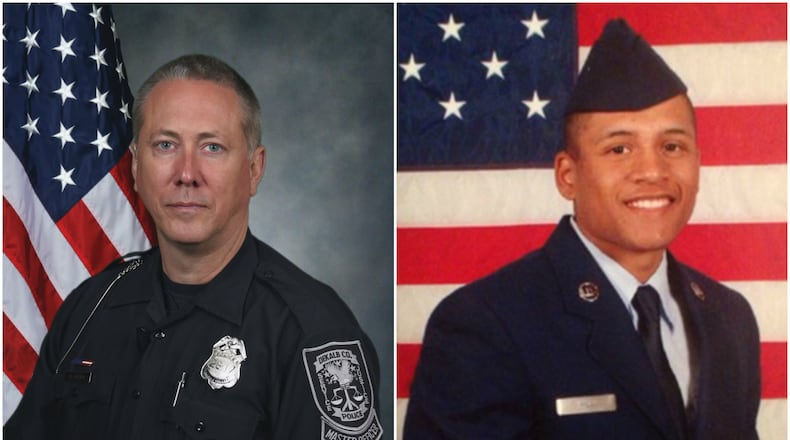A precedent shattering prosecution of a former DeKalb County cop in the fatal shooting an unarmed veteran will resume following a recent ruling by the Georgia Supreme Court.
At issue: Whether prosecutors violated the principle of grand jury secrecy when they secured indictments against Robert Olsen — the first against a law enforcement officer in Georgia in at least five years. Since then, four officers in the state have been charged with murder after controversial use of force incidents involving unarmed suspects in Atlanta and Washington County, just south of Milledgeville.
Olsen’s attorney, Don Samuel, argued that by allowing unauthorized personnel with no connection to the case into the proceedings, then-DeKalb District Attorney Robert James put the former officer at a disadvantage.
RELATED: Who was Anthony Hill?
MORE: DA to seek indictment against officer who shot unarmed vet
But the Supreme Court, in a unanimous decision, found “no unlawful conduct … and no prejudice is demonstrated by the manner in which the prosecutor conducted the evidentiary stage of the grand jury proceedings,” wrote Justice Robert Benham.
It’s been 33 months since Olsen shot Anthony Hill, a veteran of the Afghanistan War who had been medically discharged from the U.S. Air Force after being diagnosed with Post-Traumatic Stress Disorder (PTSD) and bi-polar disorder. Hill, according to family and friends, was having trouble adjusting to his medication, which they blame for his actions on March 9, 2015.
Olsen arrived at the Chamblee apartment complex where Hill lived after neighbors called 911 reporting his strange behavior. Hill had climbed down from his second-story apartment nude and was roaming through the complex, threatening no one but unsettling several residents.
After watching for several moments in a marked police car, Olsen got out of the vehicle after he noticed Hill approaching him. Olsen told him to stop but Hill continued moving towards the officer, who claimed he felt his safety was at risk.
Prosecutors say Hill had his hands in the air as he got closer to Olsen, who was armed with pepper spray and a Taser. He chose instead to shoot Hill twice in torso from about five feet away.
Olsen was charged in Jan. 2016 with felony murder, aggravated assault, violation of oath of office and making a false statement. The state alleges Olsen told another officer at the scene that Hill had assaulted him, a claim he later recanted.
MORE: Cop indicted in DeKalb shooting a ‘good man’
RELATED: Veterans rally on behalf of man shot by police
Hill had been one of 184 fatal police shootings in Georgia since 2010 documented in an Atlanta Journal-Constitution/Channel 2 Action News investigation that reviewed the victims and the circumstances surrounding each case. Of those 184 cases, Olsen was the first to face prosecution.
The challenges in securing an indictment against an officer centered on the grand jury process which allowed officers the unique privilege of observing the entire hearing and testifying without cross-examination. Georgia lawmakers later passed a bill allowing the officer in the grand jury room only to give testimony. And they can now face questions from prosecutors or jurors.
But Samuel said that the deck was unfairly stacked against his client.
Credit: HANDOUT
Credit: HANDOUT
“Grand jurors were outnumbered by non-grand jurors at times,” Samuel said during a Sept. 2016 hearing.
But the Supreme Court was not convinced that the presence of extraneous staff “violated the need for grand jury secrecy or compromised the grand jury’s independence from outside influences.”
In a statement sent to The Atlanta Journal-Constitution after the court’s ruling, Samuel said the decision “enshrines the notion that the grand jury is nothing more than a tool of the prosecution that enhances its advantage in a criminal prosecution.
“The constitutional ‘right’ to a grand jury is no longer a ‘right’ at all,” he said.
A trial date is still pending but is expected to take place sometime next year.
“We look forward to proceeding expeditiously,” said DeKalb District Attorney Sherry Boston.
About the Author






